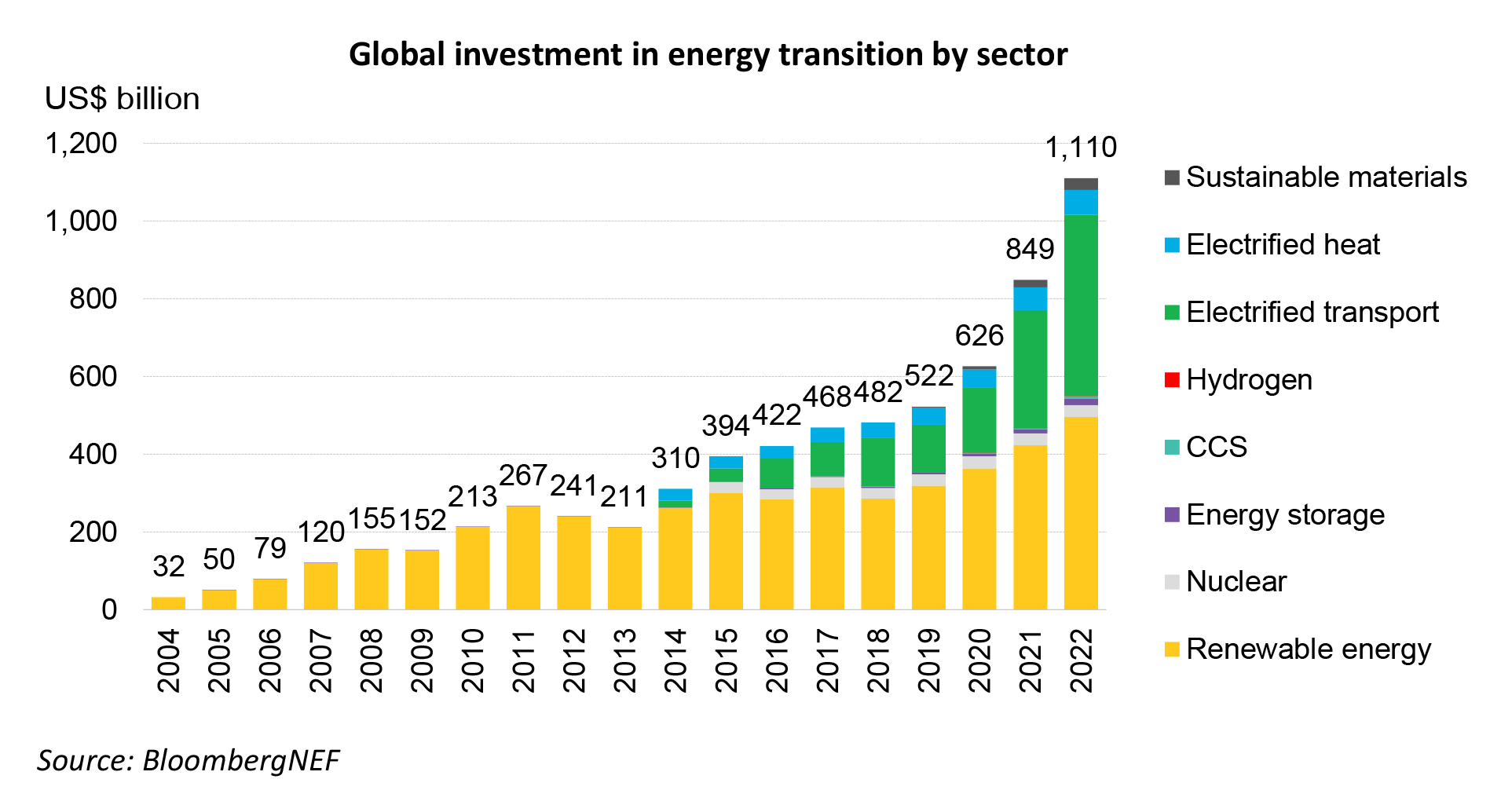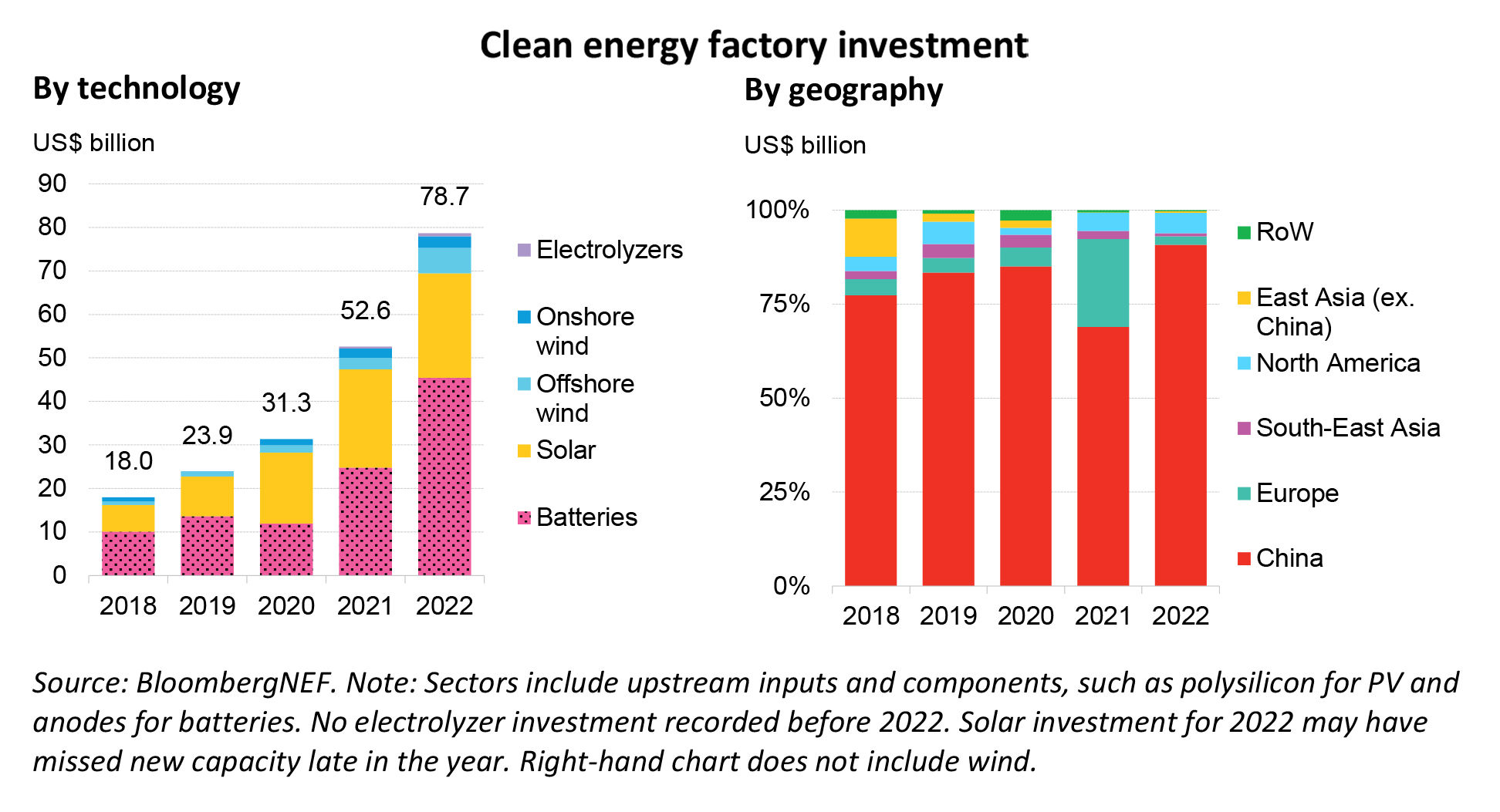Global investment in the low-carbon energy transition totalled US$1.1 trillion in 2022 – a new record and a huge acceleration from the year before – as the energy crisis and policy action drove faster deployment of clean energy technologies, according to a new report.
In another first, investment in low-carbon technologies appears to have reached parity with capital deployed in support of fossil fuel supply, research firm BloombergNEF (BNEF) says in its Energy Transition Investment Trends report.
Energy Transition Investment Trends is BNEF’s annual accounting of how much funding businesses, financial institutions, governments and end-users are committing to the low-carbon energy transition.
Almost every sector covered in the report achieved a new record level of investment in 2022, including renewable energy, energy storage, electrified transport, electrified heat, carbon capture and storage (CCS), hydrogen and sustainable materials. Only nuclear power investment did not set a record, staying broadly flat.
Renewable energy, which includes wind, solar, biofuels and other renewables, remained the largest sector in investment terms, achieving a new record of US$495 billion committed in 2022, up 17% from the year prior. However, electrified transport, which includes spending on electric vehicles and associated infrastructure, came close to overtaking renewables, with US$466 billion spent in 2022 – an impressive 54% increase year-on-year.
Hydrogen is the sector that received the least financial commitment at just US$1.1 billion, or 0.1% of the total, despite strong interest from the private sector and growing policy support. Hydrogen is, however, the fastest-growing sector with investment more than tripling over the year before.

BNEF’s data show that China was by far the leading country for attracting energy transition investment, accounting for US$546 billion or nearly half of the global total. The United States was a distant second at US$141 billion, while the European Union would have been second if treated as a single bloc, at US$180 billion. Germany retained its third place, while the United Kingdom dropped one place to fifth as France climbed to fourth.
Ramp-up needed for net zero
The BNEF report also makes a top-down estimate of global fossil fuel investments, including upstream, midstream, downstream and unabated fossil power generation. This figure, arrived at independently for the purpose of comparison, is estimated at US$1.1 trillion in 2022 – the same figure as the energy transition investment total.
This marks the first time that global energy transition investment has matched fossil fuel investment, and comes despite fossil investment growth triggered by last year’s energy crisis.
“Our findings put to bed any debate about how the energy crisis will impact clean energy deployment,” says Albert Cheung, head of global analysis at BloombergNEF. “Rather than slowing down, energy transition investment has surged to a new record as countries and businesses continue to execute on transition plans. Investment in clean energy technologies is on the brink of overtaking fossil fuel investments, and won’t look back. These investments will drive short-term job creation and help to address medium-term energy security objectives. But much more investment is needed to get on track for net zero in the long term.”
Despite the impressive results for 2022, global investment in lower-carbon technologies remains woefully short of what is needed to confront climate change. For the world to get on a 2050 “net-zero” CO2 emissions trajectory, such investment must immediately triple, BNEF estimates. Including the additional US$274 billion invested in the power grid, energy transition investment hit US$1.38 trillion in 2022. By comparison, the world must invest an annual average of US$4.55 trillion for the remainder of this decade in order to get on track under BNEF’s “net zero scenario”.
Climate-tech corporate finance reached US$119 billion in 2022. This category of investment, not included in the US$1.1 trillion total mentioned earlier, describes new equity financing raised by companies in the climate-tech space, either from public markets or private investors. The figure represents a 29% decline from the year before, driven entirely by a fall in public share offerings during a challenging year in global equity markets. Despite the turmoil, venture capital and private equity financings held up well, growing 3% on the year.
China dominates manufacturing investments
Clean energy factory investment (investments in manufacturing facilities for clean energy technologies) grew to US$78.7 billion in 2022, up from US$52.6 billion in 2021, according to the BNEF report. Manufacturing facilities for batteries and related components formed the largest share of this at US$45.4 billion, while solar factories attracted US$23.9 billion. China accounted for 91% of manufacturing investments in 2022, in spite of efforts from other countries to capture more of the global clean energy opportunity.
Between 2023 and 2026, BNEF estimates that factory investment for clean energy technologies only needs to average US$35 billion per year, to get on track for its net zero scenario. “Manufacturing capacity for clean energy technologies is unlikely to be the major bottleneck to achieving net zero,” says Antoine Vagneur-Jones, BNEF’s head of trade and supply chains research. “However, from a supply chain diversification point of view, the picture has not changed much. China is investing by far the most in building out its clean energy supply chain, and it remains to be seen if other regions can capture significant market share.”
The US has seen a wave of announcements of new or expanded factories for clean energy technologies in recent months; however these are not yet represented in BNEF’s figures, which only account for successfully commissioned factory projects.










